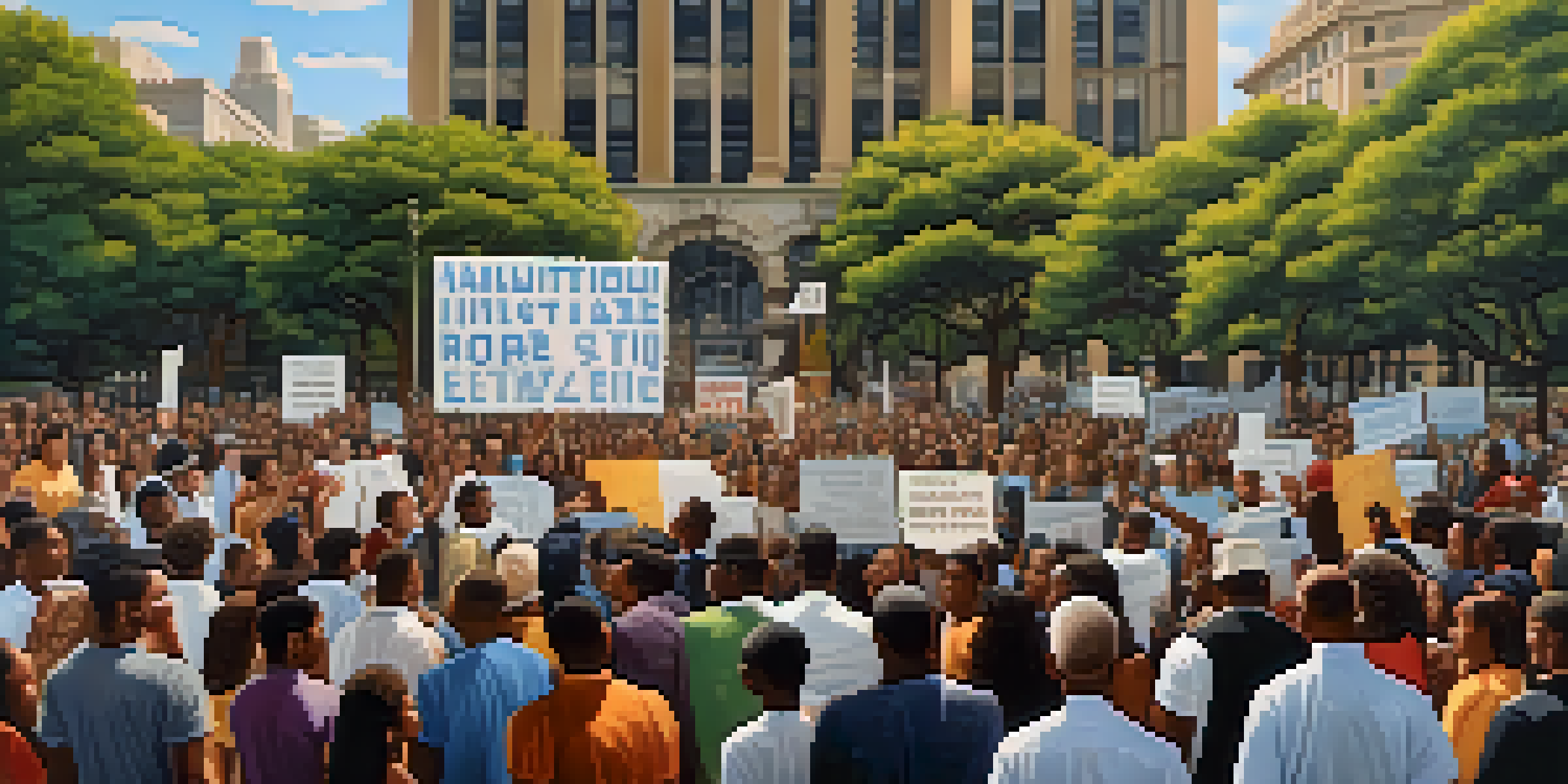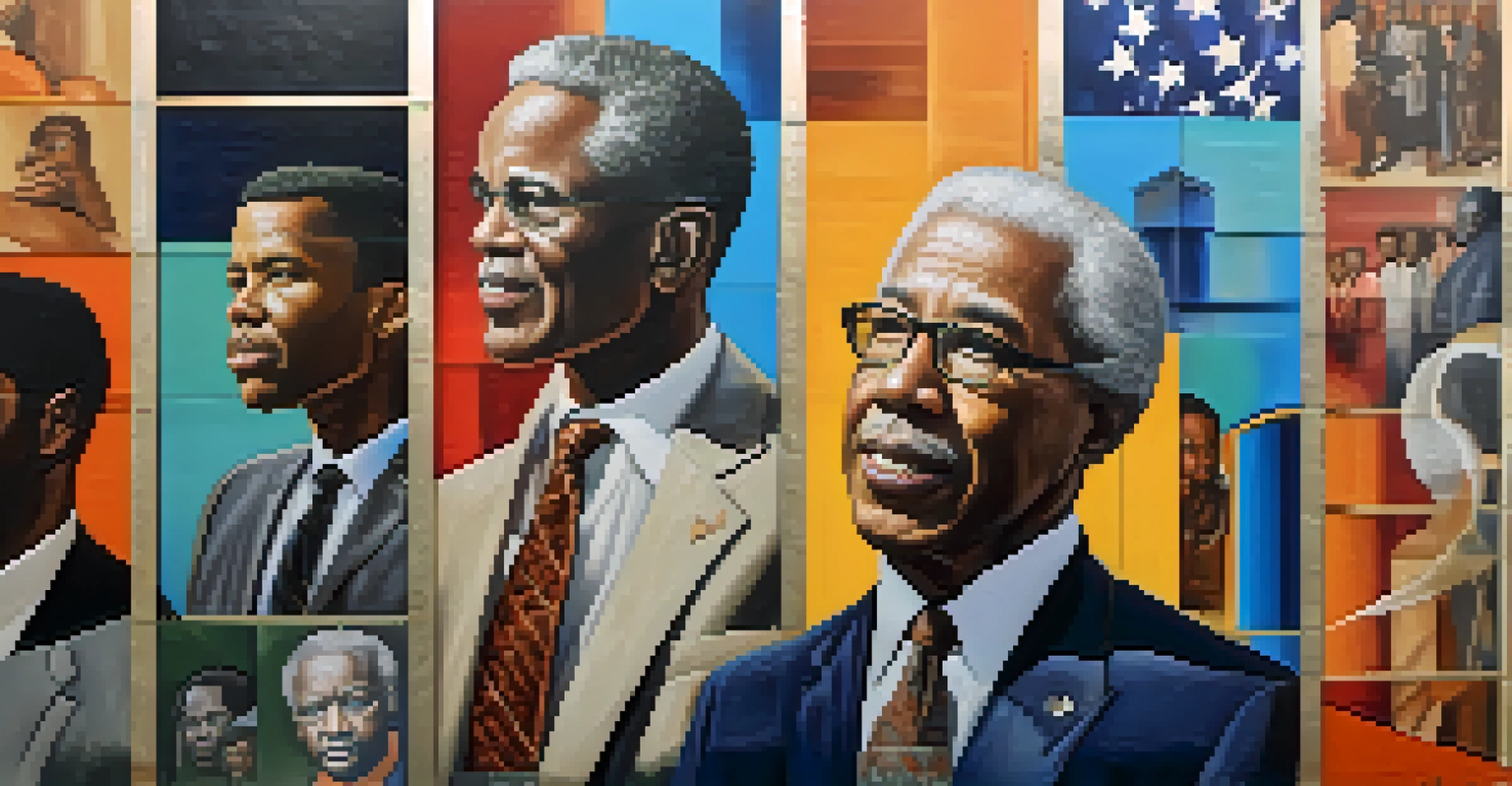Missouri's Historic Contributions to the Civil Rights Movement

The Roots of Civil Rights in Missouri's History
Missouri's history is deeply intertwined with the civil rights movement, showcasing a legacy of activism and struggle. The state was a battleground for significant events, particularly during the antebellum period when debates over slavery ignited passions. These early tensions laid the groundwork for future civil rights activism, as both black and white residents began to organize for change.
Injustice anywhere is a threat to justice everywhere.
In the mid-20th century, Missouri became a crucial player in the fight for equality, with various grassroots movements emerging. Activists in cities like St. Louis and Kansas City worked tirelessly to challenge segregation and discrimination. Their efforts not only reflected local sentiments but also echoed the larger national struggle for civil rights.
Today, Missouri's historical contributions serve as a reminder of the ongoing fight for justice and equality. The state's rich legacy continues to inspire new generations of activists who seek to address contemporary issues of racial inequality and social justice.
Key Figures in Missouri's Civil Rights Movement
Missouri has been home to several influential figures who made significant contributions to the civil rights movement. One standout is Lucile Bluford, a journalist and activist who fought against racial discrimination in education and media. Her relentless pursuit of equality led to her becoming the first African American to apply for admission to the University of Missouri's journalism school.

Another pivotal figure is Dr. William H. McKinnon, who worked tirelessly to advocate for educational equity in the state. His efforts in the 1960s aimed to dismantle systemic barriers that limited opportunities for black students. Through community organizing and advocacy, McKinnon's work helped pave the way for future generations.
Missouri's Civil Rights Legacy
Missouri's history reflects a deep legacy of activism and struggle for civil rights that continues to inspire new generations.
These individuals, among many others, exemplified courage and determination in the face of adversity. Their stories remind us that every effort, no matter how small, contributes to the larger narrative of civil rights in Missouri.
The Role of Education in Advancing Civil Rights
Education has always been a crucial battleground in the fight for civil rights, and Missouri was no exception. Segregated schools in cities like St. Louis highlighted systemic inequalities, prompting activists to demand reforms. The landmark case of Brown v. Board of Education, which originated in part from cases in Missouri, illustrated the urgent need for change in the educational landscape.
The time is always right to do what is right.
Missouri's African American community rallied around the cause of educational equity, organizing protests and advocating for desegregation. Schools became centers of activism, where students and teachers alike fought for their rights. This collective effort not only transformed educational institutions but also empowered a generation of young leaders.
Today, the legacy of these educational struggles can be seen in ongoing efforts to improve access and equity in schools across Missouri. The commitment to ensuring that every child receives a quality education remains a vital part of the civil rights narrative.
Missouri's Civil Rights Protests and Demonstrations
Throughout the civil rights era, Missouri witnessed a series of impactful protests and demonstrations aimed at challenging racial injustice. Events such as the 1963 St. Louis March for Freedom drew thousands of participants who demanded equal rights and an end to segregation. These gatherings were not only powerful in their message but also instrumental in mobilizing communities.
The protests often faced opposition, but they showcased the determination of Missourians to fight for their rights. Activists organized sit-ins, boycotts, and rallies, using peaceful means to confront systemic racism. These actions highlighted the urgency of the civil rights movement and encouraged solidarity among diverse groups.
Key Figures Pioneered Change
Influential activists like Lucile Bluford and Dr. William H. McKinnon played vital roles in advocating for educational equity and racial justice.
As we reflect on these historic demonstrations, it’s clear that they played a significant role in shaping public opinion and policy. The courage displayed by those who stood up for justice continues to inspire modern movements advocating for change.
The Influence of Missouri on National Civil Rights Legislation
Missouri's civil rights activism had a ripple effect on national legislation, influencing key policies aimed at promoting equality. Activists in the state contributed to the broader dialogue around civil rights, advocating for laws that would dismantle systemic discrimination. Their work helped shape landmark legislation, including the Civil Rights Act of 1964.
By sharing their experiences and strategies, Missouri advocates connected with national leaders, amplifying their voices on a larger stage. This collaboration highlighted the importance of grassroots efforts in pushing for legislative change. The state’s contributions underscored the interconnectedness of local and national struggles for civil rights.
Today, Missouri continues to play a role in shaping the conversation around civil rights, reminding us that local actions can lead to national progress. The ongoing fight for equality reflects the enduring legacy of the state's activists and their impact on U.S. history.
Cultural Contributions to the Civil Rights Movement
Missouri's rich cultural landscape has also significantly contributed to the civil rights movement. Artists, musicians, and writers from the state have used their talents to highlight social injustices and inspire change. The blues and jazz scenes in cities like St. Louis served as platforms for expressing the struggles and triumphs of the African American experience.
Events such as the annual St. Louis Black History Month Celebration celebrate this cultural heritage and its connection to civil rights activism. These gatherings not only honor historical figures but also emphasize the importance of art in advocating for social justice. Through storytelling and creativity, Missourians have communicated the urgency of the civil rights message.
Ongoing Activism for Equality
Despite progress, ongoing efforts in Missouri address current issues of racial inequality and social justice, reminding us that the fight continues.
The interplay of culture and activism continues to resonate today, reminding us that the arts can be a powerful tool for change. Missouri’s cultural contributions remain a vital part of the civil rights narrative, inspiring future generations to use their voices for justice.
Ongoing Civil Rights Efforts in Missouri
While significant progress has been made, the fight for civil rights in Missouri is far from over. Various organizations and grassroots movements continue to address issues such as racial inequality, police reform, and economic justice. Activists are working tirelessly to ensure that the progress achieved through historical struggles is not lost.
Recent events, including protests against police violence and calls for systemic change, have reignited conversations about racial equity in the state. Missourians are coming together to demand accountability and reform, echoing the spirit of the civil rights movement. This ongoing activism highlights the importance of staying vigilant in the pursuit of justice.

As we look to the future, it’s essential to remember that the fight for civil rights requires sustained effort and engagement. Missouri’s legacy of activism serves as a foundation for continued progress, urging us all to be active participants in the movement for equality.